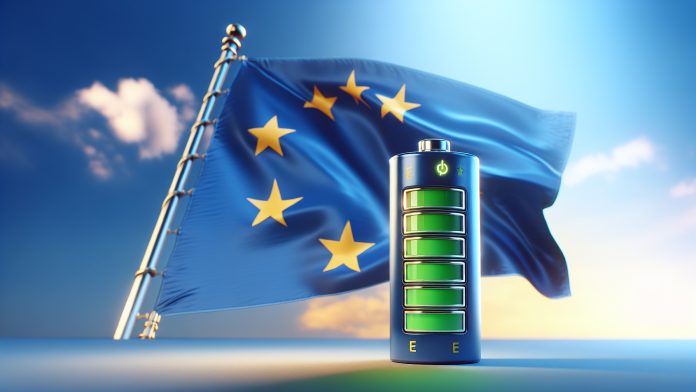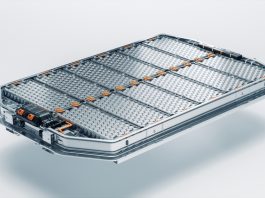The EU is making a bold move to strengthen its battery manufacturing capabilities with a groundbreaking partnership between the European Commission and the European Investment Bank (EIB).
This collaboration, announced today, will inject €3bn in public funding into the EU’s battery value chain, aiming to establish a competitive, sustainable, and innovative battery industry across Europe.
Wopke Hoekstra, Commissioner for Climate, Net Zero and Clean Growth, explained: “Europe is set on a path to become the first climate-neutral continent by 2050. Battery production is a priority for the clean energy transition in the transport and power sectors and beyond.
“The European Commission is committed to mobilising much-needed investments in cutting-edge technologies to support a resilient European battery sector.
“We are combining different financial instruments to target our support in the most efficient way and maximise private investment. The partnership with the EIB will help EU businesses and innovators to reap the benefits of innovative net-zero technologies.”
Why the EU must enhance battery manufacturing capabilities
The expansion of EU battery manufacturing is more than just a matter of economic competitiveness; it is critical for the bloc’s energy security, technological leadership, and climate goals.
Batteries play a pivotal role in enabling the clean energy transition, powering everything from electric vehicles to renewable energy storage systems. There are several compelling reasons why scaling up production is essential.
First, the growing demand for electric vehicles underscores the urgent need for a robust EU battery manufacturing sector. As the global shift to electric mobility accelerates, the EU must establish itself as a leader to reduce reliance on imports, lower costs, and create jobs in the battery and automotive industries.
Second, enhancing domestic battery production will bolster Europe’s energy security. By producing batteries locally and investing in recycling technologies, the EU can reduce dependence on foreign sources of raw materials and technology, ensuring a more stable and self-sufficient energy system in an increasingly uncertain geopolitical environment.
Third, increasing battery production capacity will drive technological innovation. With additional funding for research and development, the EU can position itself at the forefront of breakthroughs in advanced battery technologies, supporting industries ranging from renewable energy to electric transportation.
Finally, scaling up battery manufacturing is essential for achieving the EU’s climate targets. The European Green Deal, which aims to make the EU carbon-neutral by 2050, relies heavily on sustainable energy storage solutions. Investments in recycling-focused projects will minimise waste and ensure that battery production aligns with circular economy principles.
Major investments to transform the industry
The cornerstone of this initiative is a €200m top-up to the InvestEU programme, provided by the EU Innovation Fund.
This additional funding complements a €1bn grant programme designed to support the manufacturing of electric vehicle battery cells.
Alongside this, the EIB has committed to investing €1.8bn into the broader battery value chain, covering everything from research and production to charging infrastructure and recycling processes.
The €200m InvestEU top-up is specifically aimed at overcoming significant financing challenges that have hindered the sector.
Over the next three years, this funding will support venture debt operations, helping companies transition from research and development stages to full-scale commercial deployment.
The investments will focus on cutting-edge advancements such as developing advanced materials, improved component manufacturing, and innovative recycling techniques.
Goals of the EU’s investment strategy
The EU’s approach to this partnership is transformative, targeting several key objectives to bolster the EU battery manufacturing sector.
By supporting companies at critical stages of their development, the initiative aims to bridge the gap between research and commercial deployment. This effort will reduce market failures that have often obstructed the growth of innovative projects.
Additionally, the programme is designed to leverage public funding to attract private investment, amplifying the overall impact of these initiatives.
By focusing on sustainability and innovation, the EU seeks to build a robust and resilient battery supply chain that can compete globally. This includes prioritising technologies beyond basic battery cell or pack assembly and emphasising recycling as part of a circular economy.
A comprehensive approach to strengthening the battery value chain
The EU’s strategy does not end with manufacturing. The €3bn initiative addresses every aspect of the battery value chain, from raw materials sourcing to recycling.
Over the past six years, the EIB has already provided €6bn in financing for projects related to battery technologies. The new €1.8bn commitment will further enhance these efforts, ensuring that the EU is equipped to compete in a rapidly evolving global market.
The €1bn Innovation Fund call for electric vehicle battery projects, launched alongside this partnership, emphasises sustainability and advanced technology.
By focusing on innovations that extend beyond basic assembly and promoting environmentally friendly practices, the EU is laying the foundation for a greener, more efficient battery industry.
This major investment in EU battery manufacturing represents a transformative step toward building a competitive, sustainable, and resilient industry.
With batteries at the heart of the clean energy revolution, the EU’s strengthened manufacturing capabilities will not only drive economic growth but also play a pivotal role in achieving long-term environmental sustainability.









